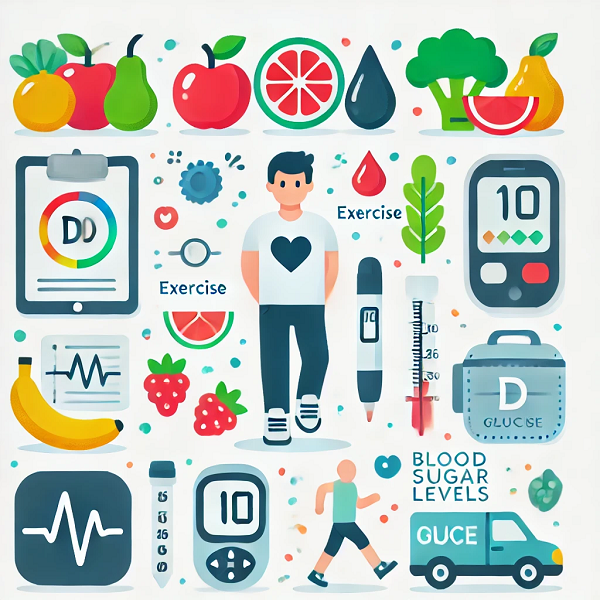Diabetes is a chronic condition that affects millions of people worldwide. Whether you have type 1 or type 2 diabetes, managing your blood sugar levels is crucial to avoid complications. Complications from diabetes can be severe, leading to cardiovascular disease, nerve damage, kidney failure, vision problems, and more. However, with the right approach, you can significantly help to prevent these complications and live a healthy, fulfilling life.
Understanding Diabetes Complications
Diabetes complications arise mainly due to prolonged high blood sugar levels, which can damage blood vessels and nerves. These complications can be broadly categorized into microvascular and macrovascular complications.
Microvascular complications affect the small blood vessels and include:
- Retinopathy: Damage to the eyes, which can lead to blindness.
- Nephropathy: Kidney damage, potentially leading to kidney failure.
- Neuropathy: Nerve damage, which can cause pain, numbness, and in severe cases, amputation.
Macrovascular complications involve the larger blood vessels and include:
- Cardiovascular disease: Increased risk of heart attack, stroke, and atherosclerosis.
- Peripheral artery disease: Reduced blood flow to the limbs, increasing the risk of infections and ulcers.
1. Prevent with Regular Blood Sugar Monitoring

One of the most critical steps in preventing diabetes complications is maintaining tight control over your blood sugar levels. Regular monitoring helps you understand how your body responds to various foods, activities, and medications. By consistently keeping your blood sugar levels within the target range, you reduce the risk of both short-term and long-term complications.
Practical Tips:
- Use a glucose meter to check your blood sugar levels as recommended by your healthcare provider.
- Keep a log of your readings to track patterns and identify areas for improvement.
- Discuss any unusual readings with your doctor to adjust your treatment plan if necessary.
2. Maintain a Healthy Diet Helps to Prevent

Diet plays a pivotal role in managing diabetes and preventing complications. A balanced diet can help control blood sugar levels, manage weight, and reduce the risk of heart disease.
Key Dietary Guidelines:
- Focus on Whole Foods: Choose whole grains, lean proteins, fruits, vegetables, and healthy fats.
- Limit Processed Foods: Avoid foods high in sugar, trans fats, and refined carbs.
- Portion Control: Be mindful of portion sizes to prevent overeating and weight gain.
- Consistent Meal Timing: Eating at regular intervals helps maintain stable blood sugar levels.
3. Stay Physically Active

Regular physical activity is essential for managing diabetes and preventing complications. Exercise helps lower blood sugar levels, improve insulin sensitivity, and reduce the risk of cardiovascular disease.
Exercise Recommendations:
- Aerobic Exercise: Aim for at least 150 minutes of moderate-intensity aerobic activity per week, such as walking, cycling, or swimming.
- Strength Training: Incorporate resistance exercises 2-3 times per week to build muscle and improve glucose metabolism.
- Flexibility and Balance: Include stretching and balance exercises to prevent injuries and improve mobility.
4. Adhere to Your Medication Regimen
Medications are often necessary to help control blood sugar levels, blood pressure, and cholesterol. It’s crucial to take your medications as prescribed and to discuss any side effects or concerns with your healthcare provider.
Medication Tips:
- Set reminders to take your medications on time.
- Keep a list of your medications and dosages to share with your healthcare team.
- Regularly review your medications with your doctor to ensure they are still effective.
5. Regular Medical Check-Ups

Routine check-ups are vital for early detection and management of diabetes complications. Your healthcare provider will monitor your blood pressure, cholesterol levels, kidney function, and eye health to catch any issues early.
Essential Screenings:
- A1C Test: Measures your average blood sugar levels over the past 2-3 months. Aim for an A1C below 7%, or as recommended by your doctor.
- Blood Pressure Monitoring: Keep your blood pressure below 140/90 mm Hg to reduce the risk of cardiovascular complications.
- Cholesterol Checks: Monitor your LDL (bad) cholesterol and aim to keep it below 100 mg/dL.
- Kidney Function Tests: Regular urine and blood tests can detect early signs of kidney damage.
- Eye Exams: Yearly dilated eye exams help detect retinopathy early.
6. Manage Stress
Chronic stress can negatively impact blood sugar levels and overall health. Learning how to manage stress effectively is crucial for preventing diabetes complications.
Stress-Management Techniques:
- Mindfulness and Meditation: Practice mindfulness or meditation to reduce stress and improve mental clarity.
- Physical Activity: Exercise is a natural stress reliever that also helps manage blood sugar.
- Social Support: Connect with friends, family, or a support group to share your experiences and reduce feelings of isolation.
7. Avoid Smoking and Limit Alcohol
Smoking and excessive alcohol consumption can exacerbate diabetes complications. Smoking damages blood vessels, increasing the risk of heart disease and stroke, while alcohol can cause unpredictable changes in blood sugar levels.
Healthy Choices:
- Quit Smoking: Seek support from your healthcare provider or a smoking cessation program.
- Limit Alcohol: If you choose to drink, do so in moderation. Women should have no more than one drink per day, and men should limit it to two drinks per day.
8. Foot Care is Crucial
Diabetes can cause nerve damage in the feet, leading to decreased sensation and an increased risk of infections. Proper foot care is essential to prevent complications like ulcers and amputations.
Foot Care Tips:
- Daily Inspections: Check your feet daily for cuts, blisters, or signs of infection.
- Proper Footwear: Wear shoes that fit well and provide adequate support.
- Regular Podiatrist Visits: See a podiatrist regularly for professional foot care and advice.
9. Stay Educated
Diabetes management is an ongoing process that requires continuous learning. Stay informed about new treatments, dietary recommendations, and self-care strategies to prevent complications.
Educational Resources:
- Diabetes Education Programs: Enroll in a diabetes education program to learn more about managing your condition.
- Support Groups: Join a local or online support group to share experiences and learn from others.
- Reliable Online Resources: Use reputable websites like the American Diabetes Association for up-to-date information.
Preventing diabetes complications requires a proactive approach to managing your health. By monitoring your blood sugar levels, maintaining a healthy diet, staying active, adhering to your medication regimen, and keeping up with regular medical check-ups, you can significantly reduce your risk of complications. Additionally, managing stress, avoiding harmful habits, taking care of your feet, and staying educated will empower you to live a healthy, fulfilling life with diabetes.
Remember, the key to preventing complications lies in consistent self-care and working closely with your healthcare team. By taking control of your diabetes today, you can prevent complications and enjoy a better quality of life tomorrow.
References:
- American Diabetes Association – Managing Diabetes – Comprehensive guide on managing diabetes to prevent complications.
- Centers for Disease Control and Prevention – Prevent Complications – CDC’s recommendations for preventing complications associated with diabetes.
- Mayo Clinic – Diabetes Complications – Detailed information on potential complications and how to manage diabetes effectively.
- National Institute of Diabetes and Digestive and Kidney Diseases – Prevent Diabetes Problems – Resources and tips for preventing diabetes-related health issues.
- Harvard Health Publishing – How to Prevent Diabetes Complications – Expert advice on minimizing the risk of complications through effective diabetes management.
#diabetes #healthylifestyle #bloodsugarcontrol #diabetesmanagement #preventdiabetescomplications #type2diabetes #diabetescare #diabeticdiet #diabetesawareness #healthyliving







